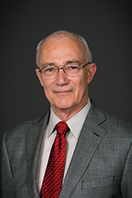 John Powell has lived and breathed Help-U-Sell Real Estate in just about every capacity. Starting out as a broker with the real estate franchise in 1989, then rising through the ranks to become regional director and COO, has made Powell uniquely qualified to understand the inner workings of Help-U-Sell Real Estate. That’s why Powell assumed the role of chief development officer for the firm this past July—no one knows better how to succeed within the firm’s set-fee, full-service model…and why there’s never been a better time to come on board than now.
John Powell has lived and breathed Help-U-Sell Real Estate in just about every capacity. Starting out as a broker with the real estate franchise in 1989, then rising through the ranks to become regional director and COO, has made Powell uniquely qualified to understand the inner workings of Help-U-Sell Real Estate. That’s why Powell assumed the role of chief development officer for the firm this past July—no one knows better how to succeed within the firm’s set-fee, full-service model…and why there’s never been a better time to come on board than now.
Maria Patterson: Let’s start with a brief summary of your history with Help-U-Sell Real Estate.
John Powell: I’ve been with Help-U-Sell Real Estate since 1989 in every position you can think of. The Help-U-Sell model was revolutionary at the time, and I developed one of the top two producing offices in the country. I had that office for about 15 years and then bought the Arizona region in 2000 and became a regional director. This basically made me a franchisor for Help-U-Sell Real Estate in Arizona, and we grew from three offices to 47.
Then the real estate market crashed in Arizona in 2006. The company began reorganizing and I went to work for corporate as COO. From 2009 to today, we’ve been rebuilding the infrastructure as far as technology and our website front-end and back-end tools for brokers and consumers. We’re now ready to start growing the system again by bringing new brokers on board and making existing brokers as profitable as possible.
MP: What made you first choose Help-U-Sell Real Estate as a broker back in 1989?
JP: I got my real estate license in 1983 when I was working with new home builders. I worked with large, regional and national home builders as a sales and marketing manager. During the recession of the late ’80s and early ’90s, however, that industry did a nosedive, so I bought a franchise with Help-U-Sell Real Estate. In the middle of the recession, I felt the community needed a different model. This was a model where you could say to the seller, “We can give you full service and save you some of the equity in your home.” I felt this was the future of real estate because it was consumer-centric and addressed consumers’ needs.
MP: How many offices does Help-U-Sell Real Estate currently have, and in what regions of the country?
JP: We have about 90 offices nationwide with a large concentration in the Southwest, but we’re all across the country. In terms of expansion, we’re focusing on California, Arizona and Nevada—we’ve had large presences in these states in the past, so our name is known. We originated in California, so it’s a good springboard.
MP: How would you describe your company’s positioning in the marketplace? What sets your company apart from the competition?
JP: We’re very consumer-centric—we’ve evolved the company based on consumers’ wants and needs. We’re positioned as a set-fee company. A lot of people lump us in with discount companies, but we’re not. We’re a full-service company.
When the founder started this company in 1976, he went out to buyers and sellers and asked, “What did you like about your last real estate transaction, what didn’t you like, and what would you like to see change?” and around their answers, he formed a company. Sellers didn’t understand how real estate agents came up with their fee, so we developed a fee based on what we do, rather than on what the price of the house is.
MP: Please explain how the set-fee model works.
JP: We determined what the broker’s overhead is—rent, utilities, etc.—added in a profit margin and then came up with a set fee. This set-fee model is structured in much the same way a consumer would pay for other goods and services. The consumer gets this model immediately, and it makes even more sense now. When the company was founded in 1976, brokers still had total control because there was no internet. Today, buyers have a free flow of information—they can get listing addresses, drive by listings and sometimes get phone numbers and talk to owners directly. Consumers only get the broker involved when they need the broker for helping them understand the information and negotiating the transaction with the best possible terms and conditions. Very early on, our motto was information without obligation.
MP: What is the biggest misconception about Help-U-Sell Real Estate?
JP: The biggest misconception consumers have about Help-U-Sell Real Estate is that they need to do a lot of the work. People call us because they know they’re going to save money, but they wonder what they have to give up in the process—the old “you get what you pay for.” They’re amazed to learn that they’re not giving up anything—that they’re actually getting more in a lot of cases.
From the broker’s perspective, they often think, “I’m struggling now to make a profit with 6 percent commissions—how will I make a profit if I’m cutting that down to a set fee?” Their perception is that they can’t make money—and if you cut commissions in a traditional real estate office, you would lose money. But our business model and how we operate is designed to make sure you’re profitable.
MP: How has your company evolved over the years and survived the challenges of the downturn?
JP: We’ve been through a period of continuous evolution ever since we started. We started out basically working with sellers, and now we’re handling all phases of the transaction, including working with buyers. During the downturn, we had to educate the system again. Now we’re back in a market where we have equity sellers and prices have come back. Our brokers are hungry for knowledge and want to learn how to grow their offices.
MP: How do you support your franchisees and help them ensure profitability?
JP: First, we are on the cutting-edge of technology—we develop it all in-house. So if a broker tells us, “I need my website tweaked to do this type of search,” we can crank that out in a very short period of time.
From a training and coaching perspective, we offer a tremendous amount of support for the broker. When they come on board with us, they start out with Help-U-Sell University, which is a modulized, online system that takes them through our culture and the consumer offering. It also provides them with an in-depth analysis of their target market to help them build marketshare. It teaches new franchisees how to recruit and set up their offices to succeed.
From there, we offer broker roundtables every week where we go over new technology developments and how to utilize them. We also have a broker mastermind group where we cover a different topic each time, such as marketing or recruiting. On these calls, we get top brokers to discuss how they’re handling different situations out there in the real world.
We also offer copious training materials through our office management systems (OMS), such as buyer training and listing training. In addition, we provide four coaching groups: one when you’ve just completed the University and want to get to your first level; one on gaining marketshare through marketing; one on recruiting; and one for masterminds doing a high volume of business who want to take it to the next level.
We also have automated marketing. A lot of times, that aspect of the marketing system gets forgotten because the broker gets so busy. We automate the marketing so the broker doesn’t have to think about it—it just happens.
MP: What are the biggest challenges currently facing your company?
JP: The education of the consumer is probably our biggest ongoing effort. However, our challenge is nowhere near what it was in 1976 or 1989.
A recent survey showed that of 2,000 real estate buyers and sellers, 60 percent of sellers got a discount on what consumers perceived was the normal commission. Forty-one percent of buyers said the same thing—a good chunk got a refund or rebate at close of escrow. The whole industry is moving in our direction and the consumer is driving that. Brokers had a monopoly on real estate information, but now, consumers can get information in countless ways. But they still need us to interpret the information and tell them what is pertinent, and negotiate the sale. A large chunk of the industry wants to keep things the way they were 30 – 50 years ago, but the consumer is driving the bus and setting the rules. The world’s finally moving in our direction.
The problem is, most brokers are new to this discounted commission because their firms are based on old business models, which cuts into their profitability. We have a system that’s built for our fee structure so it doesn’t cut into broker profitability.
MP: Where does the greatest opportunity for increased business lie?
JP: Our greatest opportunity lies with today’s consumers. The consumer is looking for value, and they want to get the best service for the best value. Help-U-Sell Real Estate has been branding that for over 40 years, and the industry has finally caught up.
The whole direction of the industry is in our favor. Brokers need to figure out how to compete in this world. You can’t just reduce commission and be profitable. You need a system in order to do that. We have that system.
MP: How are you attracting and retaining top brokers/franchisees?
JP: We have a multifaceted approach for attracting brokers. We are target-marketing California, Nevada and Arizona through email campaigns, in-person seminars and print advertising in industry publications. We recently brought on a new broker in Del Mar, Calif.—a high-end broker whose average listing is more than $1 million. He’s been in business for 20 years, but sees the change in the business and wanted to be associated with a company that already has it figured out.
In terms of retaining brokers, if we can help them be more productive and more profitable, we’ll retain them. We offer a lot in the way of coaching and counseling, as well as technology tools, all at no cost to the broker. It’s about always being there and being supportive—letting them know you care and that your sole goal is to make them as profitable as possible.
MP: In your opinion, what is most critical to your company’s success path forward?
JP: It’s critical to stay consistent in what we’re doing. We need to be ahead of the curve when it comes to what the consumer wants. Things change quickly—more quickly all the time. Not getting complacent is how we continue to move forward.
For more information, please visit www.helpusellfranchise.com.
Maria Patterson is RISMedia’s executive editor. Email your story ideas at maria@rismedia.com.












